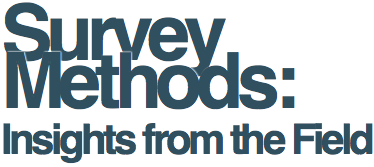Special issue: Weighting: Practical Issues and ‘How to’ Approach
Weights, what should we do with it? Although all survey samplers will agree that the inclusion of weights in any statistical analyses is necessary to avoid biased estimates, the ‘how’ and ‘why’ are less obvious for data users. In many aspects, weights are just a bit of a mystery. With this collection of articles, ‘Survey Methods: Insights from the Field’ hopes to help its reader to gain a better understanding of weights, both on what they are and on the reasons why they should be included in analyses. The editors warmly thank all the authors who contributed to the thematic collection of article, especially Pierre Lavallée and Jean-François Beaumont who kindly accepted to write an introductory article. We also would like to thank our invited editors Jean Dumais and Stephanie Steinmetz for their enthusiastic involvement in ‘Weighting: Practical issues and ‘How to’ Approach’.
Should Recall of Previous Votes Be Used to Adjust Estimates of Voting Intention?Special issue
Correction of estimates of voting intention using voter recall of previous votes is frequent in electoral polls, particularly in Europe. However, research on the impact of its use is scarce. The results presented in this paper confirm that voting is not a salient, memorable behaviour for all voters. People who always vote the same way [...]
adjustment, electoral polls, vote estimates, voter recall, weighting,
Finding Respondents in the Forest: A Comparison of Logistic Regression and Random Forest Models for Response Propensity Weighting and StratificationSpecial issue
Survey response rates for modern surveys using many different modes are trending downward leaving the potential for nonresponse biases in estimates derived from using only the respondents. The reasons for nonresponse may be complex functions of known auxiliary variables or unknown latent variables not measured by practitioners. The degree to which the propensity to respond [...]
Logistic Regression, Nonresponse, Random Forests, Stratification, Survey Response Propensity Adjustments, weighting,
Computing Sampling Weights in Large-Scale Assessments in EducationSpecial issue
Sampling weights are a reflection of sampling design; they allow us to draw valid conclusions about population features from sample data. This paper explains the fundamentals of computing sampling weights for large-scale assessments in educational research. The relationship between the nature of complex samples and best practices in developing a set of weights to enable [...]
complex samples, large-scale assessments, non-response adjustments, sampling design, sampling weights,
Weighting Procedures for Dual Frame Telephone Surveys: A Case Study in EgyptSpecial issue
Although it is a quick and non-expensive tool used to collect survey data in Egypt, the landline telephone surveys cannot reach the non-landline households, which makes up 73.4 percent of the households in Egypt according to the 2012/2013 Egypt - Household Income, Expenditure, and Consumption Survey (HIECS). Therefore, among other centers, the Public Opinion Poll [...]
cell phone surveys, dual frame surveys, telephone surveys, Weighting procedures,
The Impact of Typical Survey Weighting Adjustments on the Design Effect: A Case StudySpecial issue
In survey sampling, the final sample weight assigned to each sampled unit reflects different steps of weighting adjustments such as frame integration, nonresponse and calibration. The analysis of the design effects for each of these adjustments casts light on their effects on the precision of survey estimates. In this paper, we limit our scope to [...]
bootstrap, complex survey design, design effect, multiple frames, weighting,
How to weight survey data with a dyadic multi-actor design?Special issue
This paper deals with adjustment for nonresponse in dyadic multi-actor survey designs. It presents a multi-dimensional approach to weighting that addresses the various analytical units represented in such data, so that sampling design weights are correctly accounted for and so that consistency between weights is achieved. This approach is demonstrated by using the primary respondents [...]
dyadic data, dyadic sampling unit, multi-actor survey, nonresponse bias, weighting adjustment techniques,
Simultaneous Raking of Survey Weights at Multiple LevelsSpecial issue
This paper discusses the problem of creating general purpose calibrated survey weights when the control totals data exist at different levels of aggregation, such as households and individuals. We present and compare three different methods. The first does the weighting in two stages, using only the household data, and then only the individual data. The [...]
calibration, household, raking, weighting,






